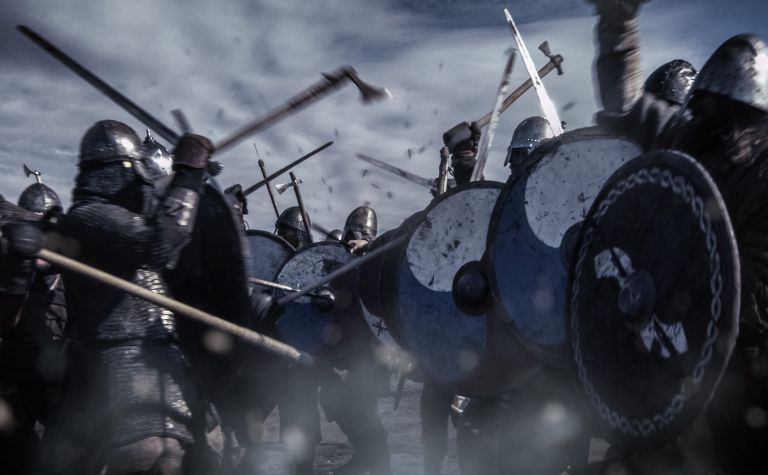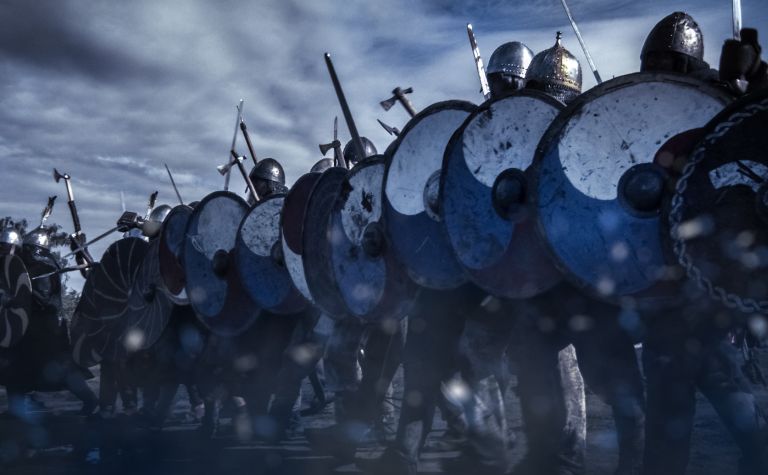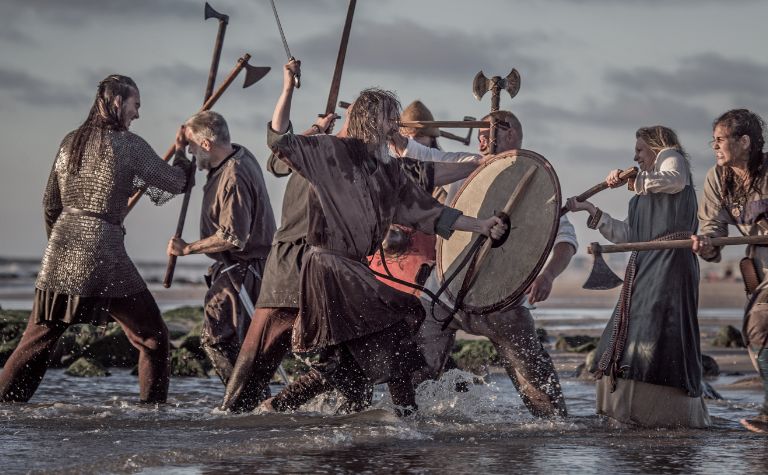The Vikings regarded Valhalla as a warriors’ paradise where the most courageous and audacious fallen fighters went after death.
This aspiration to find a seat in Valhalla was why the Vikings were not afraid to perish on the battleground.
However, it also gives birth to a question: was it necessary for a person to die in battle to enter Valhalla?
According to Prose Edda, one couldn’t enter Valhalla without dying in battle.
Only those warriors who died in action were eligible to be a part of Odin’s einherjar and fight for the gods at Ragnarok.
This article will talk more about who went to Valhalla and what kind of life they had to live to be considered a candidate for Valhalla.
Also, see Is Valhalla Heaven or Hell? to learn more.

How To Get to Valhalla
Life for Viking warriors was tough and full of testing times. Most were part of multiple brutal wars, barbaric raids, and treacherous voyages.
It took a toll on them, and few lived beyond the age of 40.
Valhalla was the ultimate goal of these fighters, the place where their wounds magically healed at the end of the day, and they had a feast every night.
It was their idea of Heaven, though that concept wouldn’t arise until the Christians and Vikings met. [1]
Every Viking fighter wanted to be a part of Odin’s einherjar. This desire to find a home in Valhalla inspired them to bravely embrace the danger of the battle and not be shy of death.
However, entry to Valhalla was reserved for a select few who possessed and exhibited certain traits.
A Viking who lived honorably and was fearless in everyday life as well as on the battlefield, was more likely to get into Valhalla.
It could have strengthened his chances even more if he worshiped Odin and was ready to devote his life to him.
Succinctly, the Vikings were expected to show the following characteristics during their lifetime to boost their possibilities of becoming a part of einherjar:
Also, see What Did the Vikings Look Like? to learn more.

Serve Odin and His Cause
It was a well-known fact that when the time for Ragnarok would come, the sun and moon would stop shining, the stars would vanish, and the earth would sink into the water.
It would be followed by a war between the gods, giants, and beasts. [2]
Odin knew the Gods were doomed to lose; still, he wanted to find a way to change the outcome of the war.
Thus, he formed einherjar, an army of resurrected Viking warriors who would fight alongside him at Ragnarok.
Valhalla was created for a singular purpose, to provide accommodation for einherjar.
It was the place where the fallen fighters brought by Valkyries lived and trained for Ragnarok.
Since getting into Valhalla was subject to Odin’s will, being on his good side could have increased one’s probability.
A warrior who believed in Odin and wholeheartedly devoted himself to Odin’s service had the best odds of finding himself in the coveted hall of Asgard.
Fight Fearlessly and Die on the Battlefield
As mentioned earlier, einherjar were specifically created for one purpose, that the chosen warriors would fight alongside Odin and other gods, such as Thor, Vidar, Heimdall, etc. at Ragnarok.
They had to fight against the likes of the monstrous wolf Fenrir, giant Surt, serpent Jormungand, and others. [3]
It was expected to be a fearsome battle. Moreover, gods and those on their side were destined to lose.
A warrior who wanted to fight for the pantheon of gods had to be fearless in the face of death.
An excellent way to test if a fighter was truly unafraid and ready to die for a just cause was to closely observe his performance on the battleground.
During the Viking era, battles used to happen quite frequently, and most Vikings were a part of them in some capacity.
However, the warrior whose intent and action showed that he was willing to embrace death for the cause he believed in had a better likelihood of scoring a place in Valhalla.
Live a Just and Righteous Life
Entry to Valhalla was reserved for fearless and valiant warriors who fought and killed enemies.
Hence, one might think that the more people one butchered on the battlefield, the better his prospects of being a part of the einherjar. That, however, was not the case.
Valhalla was a place for those who were pure and just at heart. And, a fighter’s suitability for einherjar was determined based on the reason behind his kills.
He stood a chance only when the killings were morally justified and necessary and not done for selfish reasons.
A Viking who was greedy, dishonest, cruel, or indulged in other sins had no chance of entering Valhalla. [4]
Also, see 11 Facts About Viking Longhouses to learn more.

Do All Vikings Go to Valhalla?
Now that it’s established that a Viking who fought bravely and died in action was a strong candidate for Valhalla, the next question is: was it possible for any Viking to enter Valhalla?
Not all Vikings went to Valhalla. Only those who met all the requirements – i.e., they lived an honorable life, showed great courage and determination in their behavior, and died on the battlefield – would make it there.
A person’s gender or social status did not restrict one’s entry to Valhalla.
The Vikings believed that many women were as competent fighters as their male counterparts.
That’s why they fought in a battle alongside the male members of society and held different positions, ranging from low-level fighters to high-level military officers.
Women were an integral part of the pantheon of Viking gods as well.
There are mentions of multiple goddesses, Valkyries, and other female characters in Viking stories who shaped and defined these legends.
Since women played such a crucial role in the realms of god and humans, it’s safe to assume they would have been a part of Valhalla as well.
Norse mythology doesn’t preclude anyone from joining Valhalla because of their social standing.
Since Odin wanted to gather an army of valiant warriors, it makes sense that their performance on the battlefield would have been the deciding criteria while recruiting them, not their social status.
However, a Viking warrior still had to die on the battleground to go to Valhalla.
They would have likely found themselves at Hel if they died of other causes, such as sickness or old age. [5]
Conclusion
Any Viking who lived an honorable life, served Odin, and died in a battle could have gone to Valhalla.
Also, see How Did the Vikings Stay Warm? to learn more.
References:
[1] Source
[2] Source
[3] Source
[4] Source
[5] Source
